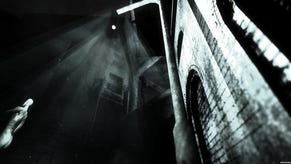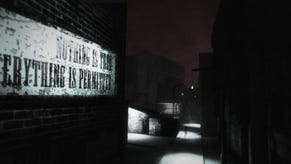Modernish Modernist: Tangiers
“ a riot against elevator music”
When I saw the first video of Tangiers, a stealth game set in a bizarre world lifted from the vision of modernist writers such as William Burroughs, I felt a sudden flash of synchronicity. I too had wanted a game that took something from these kinds of fictions, and it was actually this idle blog post that first launched me into making videogames rather than simply writing about them. Because he was now making something I had only previously imagined, I knew I had to meet Tangiers' creator, Alex Harvey.
Conveniently, he turned out to live just down the road.
I met Harvey in a distinctly unBurroughsian chain cafe on Bristol's Park Street, where we drank weakly lattes and talked about our mutual interests in modernist writing. “There's a little chain of 20th-century avant garde following Dada, William Burroughs, and so on,” he explained. “I followed that in reverse, and it's been a big passion of mine since I discovered it. When I came to realise I wanted to make a game, I wanted it to be about something I really cared about. So Tangiers became about exploring the intentions of those artists in a medium where it hasn't been explored all that much.”
I mentioned my similar desires for that blog post from all those years ago, which was itself randomly republished as a pamphlet at Nottingham's Game City event, and discovered that Harvey had already seen it. As we talked I began to realise that his knowledge of this stuff is probably a bit deeper than my own: “Have you seen Decoder? It follows a lot of what you wrote. It's a collaboration between William Burroughs and Muscha, and it's about starting a riot against elevator music by disseminating tapes of cut-up noise.”
Sounds incredible, I said, taking notes.
Tangiers, though, is perhaps rather more recognisably traditional, at least within the medium of games. It is, despite its weirdness, sat well within the historical genre lineage of PC games, and particularly games since Thief. “At it's core it's a stealth game,” Harvey says, “I am trying to go back to basics, a sort of 'let's go back to 1998' sort of thing. It's very open-ended at the start, that sort of “dropped in the middle of nowhere” open-ended that you got in Arena and other older open-world games like that. From there you explore the world and find cityscapes to infiltrate.”

The game is wide open, but goes on to focus on very Thief-like sneaking and back stabbing. Of course it does start to depart from the normal routine of such things when Burroughs-type fictions start informing the environment and the mechanics, as Harvey explained: “The only bit of exposition in the game is a title card at the start which tells you that you need to kidnap and dispose of six other beings in the world. From there you make your own way, hiding in the shadows, manipulating hostile environments to get through them, and so on.”
Quite the ambition for someone who has only just started making games.
“A year ago I didn't have any skills at all in the field,” says Harvey, quite matter-of-factly. “Since then I've spent every spare moment sat in front of Unity, working on this.”
Ah, Unity. The saviour of the newbie, the foundation of a new wave of indie creativity. “I love Unity,” says Harvey, “especially for workflow. I can close Blender and just see the changes pop up in the editor. Fantastic.”
“Antares Universe is what I am using for putting the code together. It's like a visual scripting language. It's all circuit diagrams, very good for debugging because you can change the scripting as you run the game. That and Unity are perfect for someone with, shall we say, limited technical knowledge.”

Harvey has also taken the plunge on taking to the game full time, having initially made it a part-time affair. “I've been working on it for seven months now, but for the past two months I've quit my job and started going on it full pelt! We've got most of the core elements in there, and the AI is just about implemented. Everything will come together once we have the gameplay objectives implemented.”
One of these core elements is, of course, to attempt to create a game-mechanic based on Burroughs' modernity-defining “cut-up” technique, aka sampling. Harvey's plan is a cut-up system that involves sections of the world you end up exploring: “The cut-up mechanic we're implementing in the game is going to be mechanically quite similar to the chaos system in Dishonored, but more far-reaching. So the more disruption your interactions in the world cause, the more dramatic the cut-ups will be. That will be areas you've already visited melding with areas you visit later. For example one early area you can visit has docks and a lighthouse, and if you are careless there, backstab too many people, then in a later level fragments of that lighthouse become embedded in new buildings. The angle of the light will become steeper, too, moving down from just cross the rooftops to street level. So your interactions might mean that you find yourself with a roving searchlight to deal with as you attempt your stealth actions.”
“There's an aesthetic angle to it, too. Different textures, odd walkways appearing, and so on.”
“We want the replayability of procedural games, but not making it full-blown procedural systems. So there are pre-defined points in each level, but levels you visit later will be able to take points from the levels you've visited and decided which is the appropriate one to include based on your behaviour and play in the levels you've already visited.”

What Harvey is doing with Tangiers is without a doubt born of ambition and of the audacity of inexperience, but be in doubt that this is a good thing. He's been inspired in a way that so few games truly are. He might struggle to realise his vision, but the attempt to do so is laudable.
As our time together ended he was discussing what to do next. Find private funding? A Kickstarter? What? He had plans, but - as with so many projects I have encountered at this early stage - nothing was certain. It seems unlikely that a publisher might take it on. But perhaps they should? Or perhaps one of the other diverse entities that could now help indies like Alex Harvey. I'm looking at you, Indie Fund.
Either way, Tangiers must see the light of day, and I trust in Mr Harvey's passion to see that happen.
Tangiers will be done, well, when it's done.










